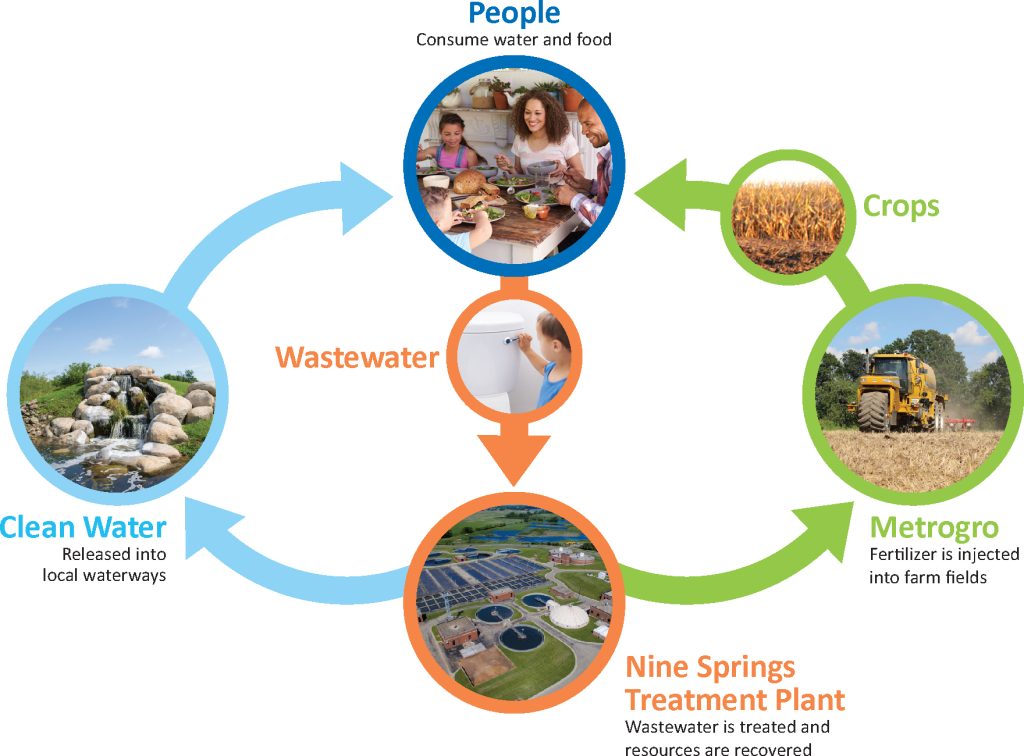Biosolids are a valuable resource that supports Wisconsin’s rich agricultural history. There are also significant ecological benefits to the use of biosolids in agriculture. Continued support of wastewater treatment plants’ ability to land apply treated biosolids products is critical to support soils, keep operating costs low for farmers and positively impact the environment in a number of ways.
Here are a few important benefits of using biosolids as fertilizer, like is done with the District’s Metrogro biosolids program.
Biosolids Benefit soil health
Biosolids are the solid, organic matter recovered from the wastewater treatment process. Biosolids contain nitrogen, phosphorus and other micro- and macronutrients that are essential for plant growth and soil fertility, which supports crop production. In addition, biosolids improve soil structure and soil’s water-holding capacity, which helps capture carbon and protects against flooding.
Biosolids promote resource recovery
Two key ingredients in fertilizers — phosphorus and nitrogen — are non-renewable resources that are experiencing global shortages. Long-term, a reduction in the availability of these resources could have catastrophic impacts on agricultural worldwide. Furthermore, these components for commercial fertilizers are mined from rocks (also considered a non-renewable resource) and the extraction and isolation of these ingredients relies on fossil fuels. By using biosolids in place of commercial fertilizer, farmers help support local resource recovery efforts.
Land application is Cost-Effective

The reuse of biosolids has fewer environmental impacts than other disposal methods. Like many wastewater treatment agencies across the state and nation, our District relies on land application of biosolids to manage the solids we recover through the wastewater treatment process. Alternatives to handling biosolids — landfilling and incineration— waste a valuable resource, have environmental consequences that are significantly greater than land application and are more costly for ratepayers and communities.
Biosolids Benefit farmers‘ BOTTOM LINE
When farmers and landowners apply biosolids, they can reduce reliance on costly commercial fertilizers. Biosolid-applied soils don’t always need additional fertilization. Farmers that partner with a local biosolids program like Metrogro can benefit from significant cost savings through their ability to purchase a lower (or zero) volume of commercial fertilizers.
Biosolids are safe
District biosolids undergo a rigorous biological, physical and chemical treatment process to ensure safety and to comply with the regulations set forth by the Wisconsin Department of Natural Resources (WDNR) and the U.S. Environmental Protection Agency (USEPA). Our biosolids product, Metrogro, is tested regularly for quality and safety.
In addition, District biosolids are applied only on fields that have been authorized through a permitting process, and applications are regulated by both the WDNR and USEPA. Sites are also subject to regulations set forth in Wisconsin Administrative Code NR 204. These standards are put in place to protect water quality, the environment and human health.
You can read more about the District’s resource recovery efforts in the article “Metrogro and Yahara WINS are partners in phosphorus reduction” on our blog.






